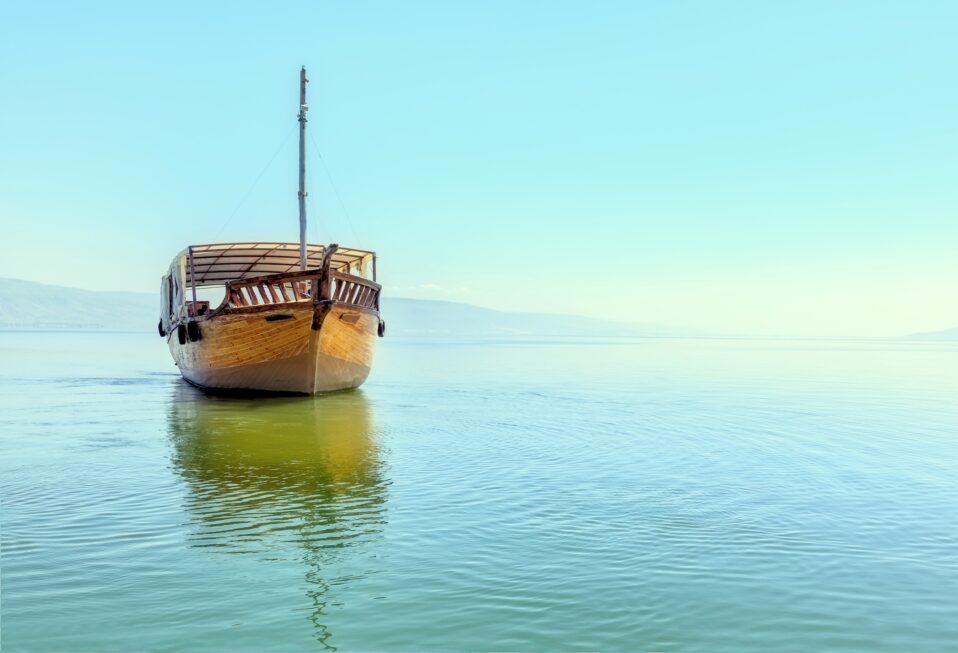By Marc Turnage
The Sea of Galilee is the lowest freshwater lake on earth. It sits 600 feet below sea level. It is a lake, and not a sea; thus, the Evangelist Luke correctly describes it often as a lake (5:1; 8:22, 33).
The Lake of Galilee sits in the Jordan River Valley, which is part of the Syro-African Rift Valley. The Jordan River flows through the lake from the north where its three headwaters converge south of the ancient site of Dan to form the Jordan River and flow south into the lake. The river continues out of the south end of the lake on its southward journey towards the Dead Sea. The modern exit of the Jordan River on the south end of the lake is not the ancient exit of the river; the modern exit was created for the dam used to regulate the flow of water out of the lake.
Hills surround the lake on its western, northern, and eastern sides. To its south, one finds the continuation of the Jordan River Valley. On its northwest and northeast corners sit two fertile valleys into which water runoff from the surrounding hills flow. The northwest valley is known as the Gennesar Valley, which the first century Jewish historian Josephus says was the name given to the lake by the locals (see Luke 5:1). The valley on the northeast side of the lake is the Bethsaida Valley, so called for the ancient site of Bethsaida, the home of Jesus’ disciples Peter, Philip, and Andrew, which was located in the valley along the shoreline of the lake.
The Bethsaida Valley, while fertile, has three large water tributaries, including the Jordan River, flow through it, which made it more challenging for travel by foot. Two of these tributaries flow out of the Golan Heights feeding the water of the lake along with the Jordan River. Between the Gennesar Valley and Bethsaida Valley ninety-five percent of Jesus’ ministry recorded in the Gospels took place. He fed the 5,000 in the Bethsaida Valley (Luke 9:10). Within this area, one finds the villages of Capernaum, Chorazin, and Bethsaida, which Jesus cursed (Luke 10:13-16).
South of the Gennesar Valley sits the modern city of Tiberias, which was built by Herod Antipas, the son of Herod the Great, in the year 19-20 A.D. Antipas moved his administration from Sepphoris to Tiberias, which was where he resided during the ministries of Jesus and John the Baptist.
The lake itself provided a fishing industry for the locals. The water off the Bethsaida Valley provided excellent fishing, especially for the local tilapia. People used the lake not only for fishing, but also for travel. Both Josephus and the Gospels indicate that people traveled around the lake by boat much more than they did by foot.
The Gospels record the sudden storms that occur on the lake. The topography of the surrounding hills and canyons create wind funnels across the lake, particularly the northern part of the lake. Storms on the Lake of Galilee are serious, especially the wind storms that blow in from the east off the Golan Heights down onto the lake. The easterly wind storms that hit the land of Israel are quite severe, and even in the present day, can cause damage to property and agriculture, even the loss of life. These easterly winds are known as sharkia, from the Arabic “shark” (east). They are most prevalent from October-May. They turn the lake’s waters into churning, violent swells, easily 10 to 12 feet high.
The Lake of Galilee provides the setting for many of the stories in the Gospels, sayings and actions of Jesus. On its shores, He taught the people about the kingdom of Heaven and performed many miracles.
Marc Turnage is President/CEO of Biblical Expeditions. He is an authority on ancient Judaism and Christian origins. He has published widely for both academic and popular audiences. His most recent book, Windows into the Bible, was named by Outreach Magazine as one of its top 100 Christian living resources. Marc is a widely sought-after speaker and a gifted teacher. He has been guiding groups to the lands of the Bible—Israel, Jordan, Egypt, Turkey, Greece, and Italy—for over twenty years.
Website: WITBUniversity.com
Facebook: @witbuniversity
Podcast: Windows into the Bible Podcast




Comments(2)-

-





Judy says
March 10, 2023 at 1:10 pmVery interesting I’d always wondered about that how the season how God calmed the storms
Brenda Parker says
March 11, 2023 at 12:33 pmVery interesting and lots of information.
Receive Devotionals and News Updates from Israel
Recent Posts
Parashat Terumah (תְּרוּמָה) “Offering”
The Biblical Heartland and the Battle for Sovereignty
Elderly Widow: Golda’s Story
Sepphoris and the World Jesus Knew